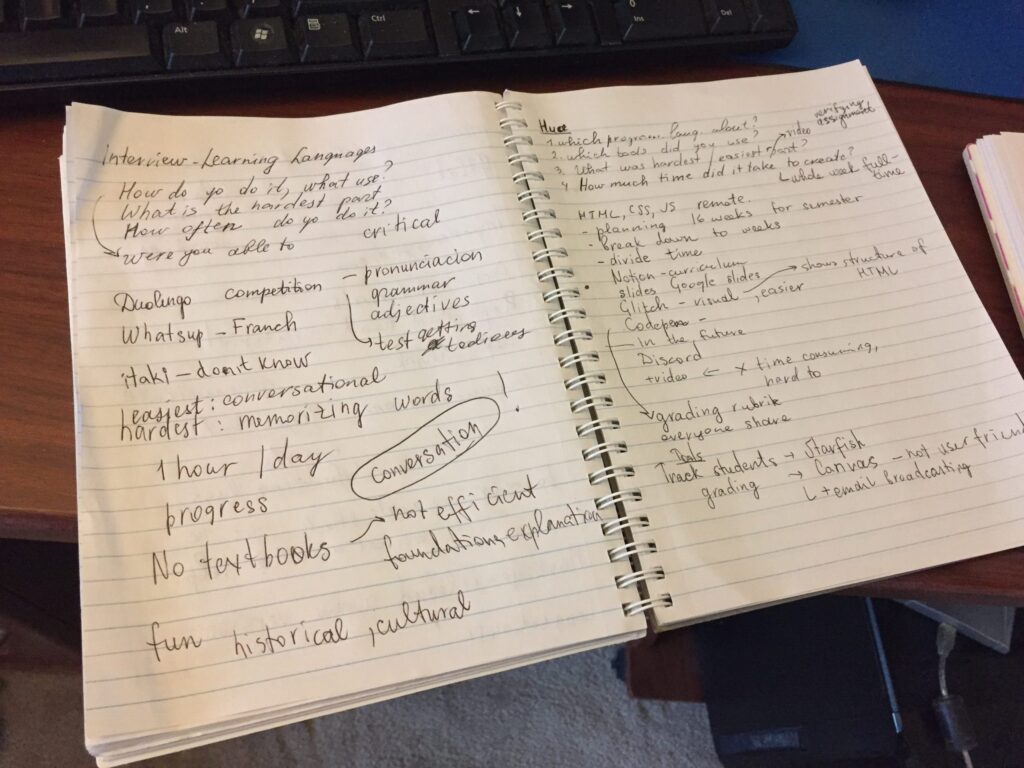Well, the title is slightly confusing. Because I’m not looking for any idea (I have an 80-page Google doc full of them), to be more prices, I’m looking for an idea that:
- I can implement (at least start as a solopreneur)
- could be interesting for me from the meaning and technical point of view
- solves real problems
- has a market.
So, I had several ideas such as: an app for learning language, a service for creating coding courses, and video editor.
What I did
- I found several people who were so kind and generous to share their experience with me
- searched online communities carefully to find a problem or some pattern in users’ complaints
- checked the existing solutions on the found problems to see if there is a market.
Additional goal
My goal was not solely to figure out which idea to pursue but also:
- to prove myself that I’m able to do such things as user interview because I have never done it before
- to have some experience in it and see if it’s for me or not
- to develop the skills to talk to people; ask questions; get the answers.
About me in this context
I always considered myself as a true, deep introvert. Until the moment when I was 17 and lived in the university’s dorm where we talked a lot about psychology, science, and other super interesting stuff. One night we discussed introverts and extraverts, and my friend told me then she thought I was a pure extravert. It was a big surprise for me then but I think I know what was going on. I was (and still) very shy with strangers, but I’m okay with friends, neighbors, relatives what makes me a “mixed type”. But conducting the problem interview means ALWAYS talking to strangers and it was going to be a real challenge. And it was!
But strangely, I never felt a fear (unlike job interviews). I tried to be prepared as much as I could, be fun and polite. I also tried to watch how people react and what they actually think. It wasn’t easy because everyone is so different but it was a really great experience. And I always felt the support from people.
How I did it and tips/tricks
Used resources
- the video about customer development and interviews (in Russian) by Ivan Zamesin https://www.youtube.com/watch?v=96nfI6ie4Jk (unfortunately, there are not CC in English)
- other resources like this https://customerdevlabs.com/2013/11/05/how-i-interview-customers/
- book: Lean Customer Development: Building Products Your Customers Will Buy by Cindy Alvarez
Step 1. Research
I did a lot of research first – went to Reddit, IndieHackers, HN, FB, and some others. I was trying to find a pattern. It was so easy for the language learning – just because it’s never easy. I created Google spreadsheets for each problem (as I described here https://seacat.blog/i-started-user-pain-research-and-my-current-results/)
Step 2. Found people for interviews
For the language learning, I created a post on Reddit (I deleted it after) but nobody reacted and the post was downvoted. I think it’s because I was slightly off-topic – people there mostly focused on their own problems. Then I went to FB and created a post there in some business group that I was a member of for a long time. After approval, it was published and I’d got 3 people who agreed to talk to me (I conducted 2 video calls and had one chat).
As for the coding course service, I didn’t find any specific place where I could publish a post, and just found around 10 people I sent emails and direct messages in Twitter (some people are totally okay to get direct messages, but not all, especially if they don’t follow you). One person just saw my tweet and replied to me in the comments (I didn’t DM her). Eventually, I had 3 chats (by email and Twitter) and four video calls.
Step 3. Interview preparation
I took my paper book and wrote questions there (I rewrote them for each interview). Most of the questions were:
- How do you do — ?
- How often (when) you do it?
- What is the biggest problem with it?
- What would you like to have? be able to?
I never shared my ideas, only gave a vague description – just to avoid any biases and, because people know only what they know for sure (the present and the past, but not the future).
Step 4. Interviews!
It was easy, I did all of them in the same sequence:
- Short intro of myself
- Started asking questions
- Sometimes small talk, or slightly non-related questions
- The words of appreciation and hearty good-bye.
During the interview, I made the short notes in my paper notebook. Why I didn’t use anything else:
- I didn’t record anything because it’s not what I would like if I’d been interviewed
- I didn’t type although I could (I can blind type) – but I hate when an interviewer types during the interviews
- people usually even don’t notice when you are writing and are amazed when you show them a full covered page, so it’s an easy way to make a great impression.

Step 5. Conclusions…
This part is the hardest. I’m still thinking and I will decide by the end of the week (I hope), so then I will share with you what I decide. What I’m going to are:
- read my notes
- make more searches on the Internet
- estimate feasibility.
Question? Comments?
1 thought on “How I’m looking for a good idea”
Comments are closed.